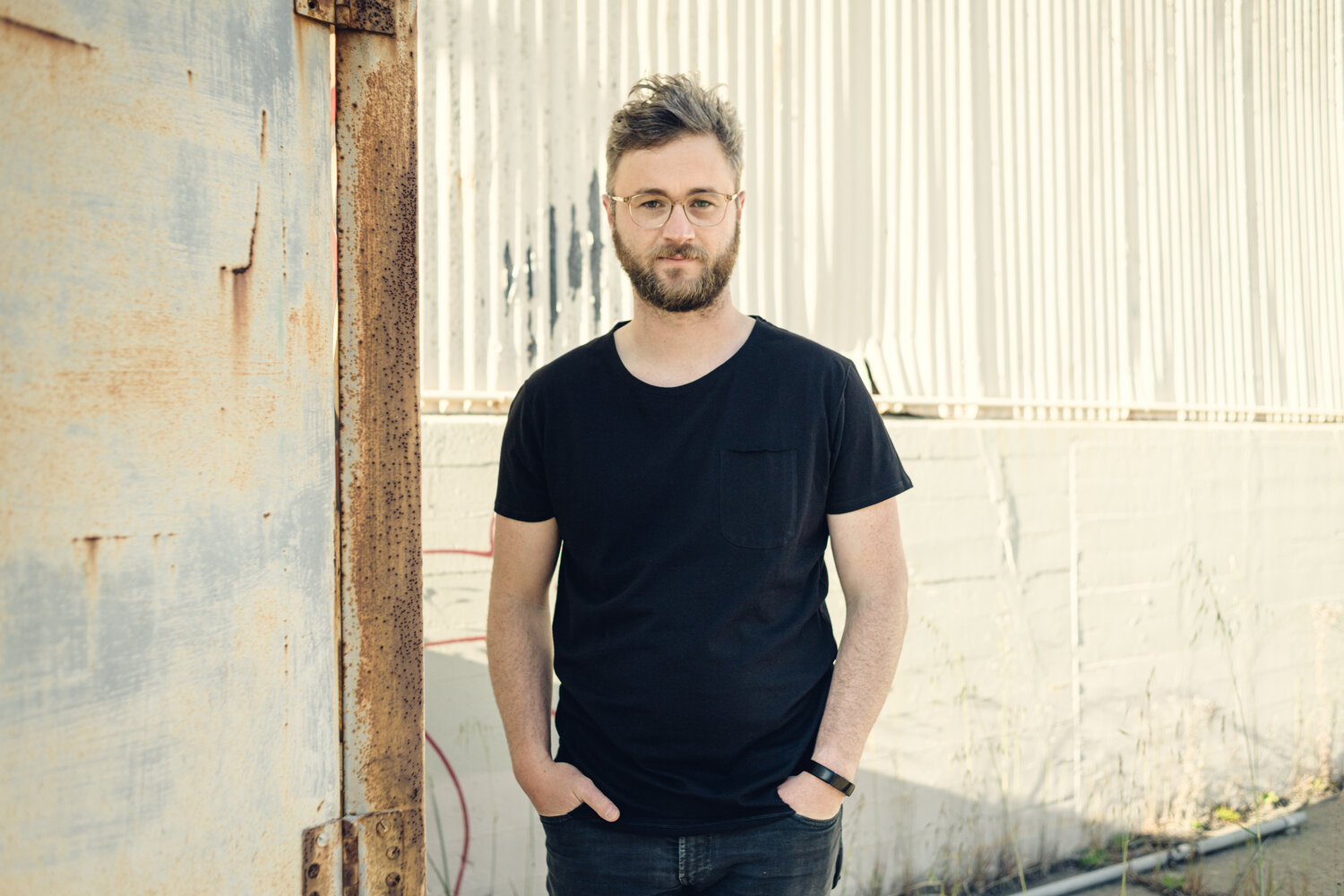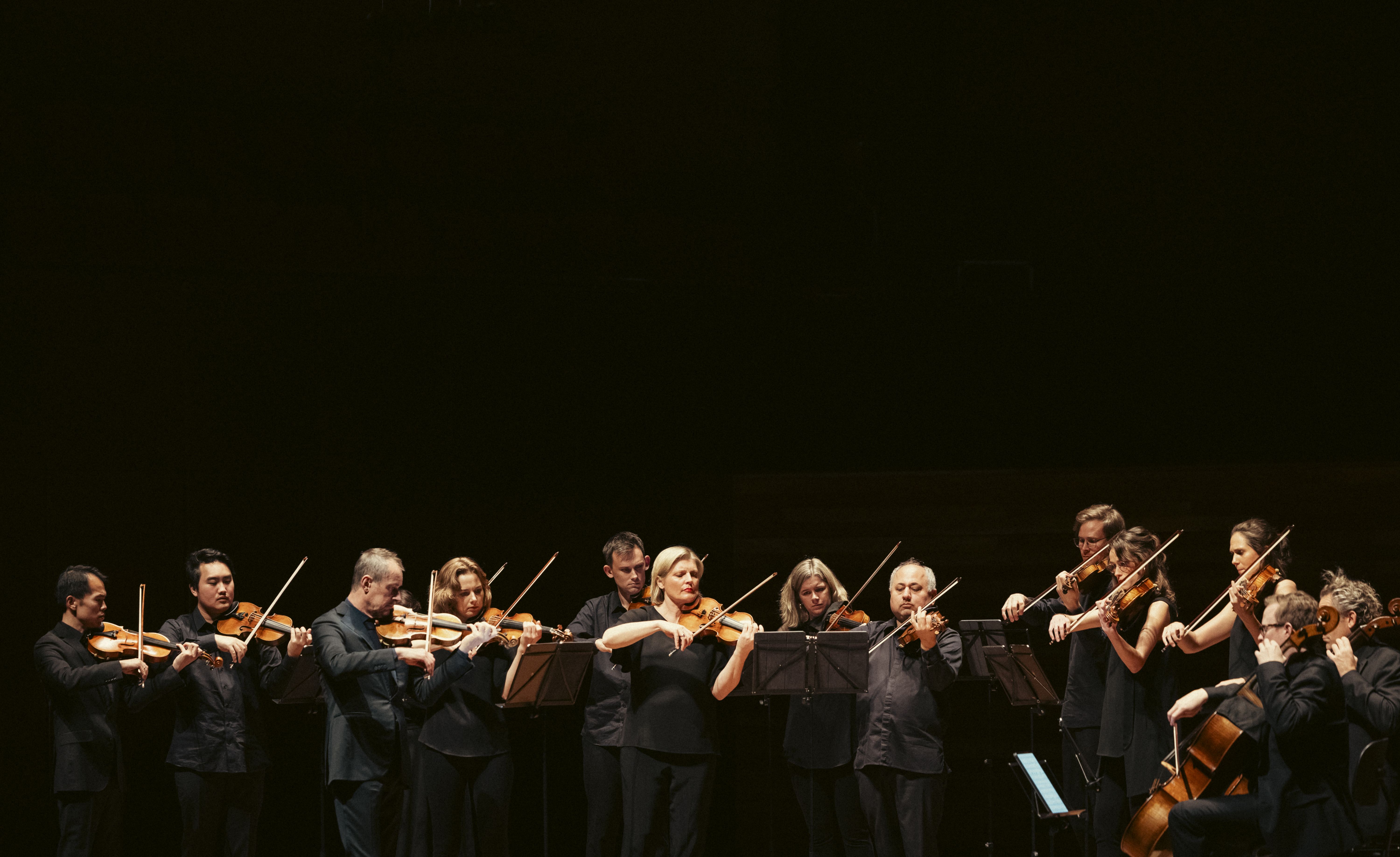
On the first morning of the first day of this year, Samuel Adams sat down to compose a piece of work like nothing he’d done before. He was back in San Francisco in a new apartment, with a new baby and his wife, a violinist, had just returned to work. It was a moment of pressure: he figured he had only five months to finish the piece, a short electric violin concerto co-commissioned by the ACO and Stanford Live. Previously Adams has been commissioned by the two and produced Movements (for us and them), inspired by the Baroque concerto grosso form. This was to be different. Adams had been walking in vastness.
“I was basically by myself, going on really long walks every day in the desert,” he says of his time living in Reno, Nevada during the height of the pandemic, “and paying attention to the minute changes over the course of the 18 months I was there. I think being out there really changed me. Being in the rhythm of life that didn’t change day to day, didn’t have the kind of interruptions that we’d encountered in the pre-Covid times. So that feeling of being in a kind of mental space with few external interruptions somehow made its way into this piece. I think you’ll hear that very clearly.”
The son of legendary composer John Adams and photographer Deborah O’Grady, Adams has had few opportunities to slow down. A graduate of Stanford University and student performer on double bass, he is now in his late 30s and has an impressive reputation for contemporary classical work through an array of musical disciplines, including classical modes, improvised music, field recordings and his acclaimed work with electronic instrumentation in the classical arena. His willingness to collaborate, explore new forms and produce music for a variety of audiences has seen him gain commissions and residencies from orchestras and conductors both American and international, and in 2019 he was given a Guggenheim Fellowship. Working across the world in many spaces he has become fascinated with resonance – “how space affects how we listen” – and with the potential for electric instruments to transform the relationship between composer and performers.
“With the electric violin, you can really make it sound like anything,” he says, speaking about Echo Transcriptions, the ACO and Standford-commissioned concerto for electric violin he has written, which Richard Tognetti will perform in our upcoming The American national concert tour. “You can make it sound like a wall of noise, like a synthesiser, literally have it do anything. But Richard is fundamentally a violinist, so the challenge with this piece was really to find that fine balance between allowing the instrument to function in a way that pays tribute to his expertise as an acoustic violin player, while also giving him the opportunity to explore sonically.”

“I’m taking a step back, to let Richard Tognetti make those big sonic decisions. I’m really curious to see what he does with it.”Samuel Adams, composer.
Adams, who had an instant rapport with Tognetti over electronic music when they met nearly 10 years ago, is thrilled when the initial compositional ideas are completely transcended by those he calls “a master musician, like the members of the ACO. That is a very satisfying thing when that happens. When you realise you’ve created enough interpretive flexibility in your music that it can sound better than you had anticipated”. For this work, he says, “I have a couple of general sonic ideas that I’m encouraging him to explore, like I would with an acoustic violin piece, but I’m taking a step back, to let Richard make those big sonic decisions. I’m really curious to see what he does with it.”
Working with uncertainty was part of Echo Transcriptions from the start. “Paradoxically, when I’m feeling the burn of a deadline I find myself writing more intuitively. I don’t have as much time to analyse every little detail and second-guess everything.” Everything in the piece is tested, he hastens to add. “When I started it, I just had a very simple impulse and I let it go. It’s really just this one simple idea that gradually transforms, in the way it’s orchestrated and also in the way that the electronic manipulations evolve over the 12 minutes of the piece. I’ve never done anything like this before.”
The score undulates, braids and surges across the measures: “it’s a series of waves, it’s one 12-minute unbroken line that crests and falls – there’s no breath, really, in the entire work.” Adams was cresting new parenthood, a global crisis, a relocation, a time of hectic social flux and reassuring natural rhythms; surfers will recognise the oceanic swells of this music.
“I thought a lot during the pandemic about what I want my audiences to hear, about creating a piece that is uplifting,” he says thoughtfully. “I certainly feel that that is the hardest thing to do. It’s much easier to wallow in despair and write dark, grey music – I can do that, I think anyone can do that. So with this piece I really wanted to challenge myself to make something that felt grounded, and uplifting at the same time, that had a sense of weight and aims upwards.
“I try to reinvent myself with every piece, which of course is impossible, because with every piece I’m forced – if I’m really, truly composing – to ask myself what fundamentally matters to me, and those things don’t change. It sounds so banal to say this, but the moments in my life that have the most meaning are musical moments: whether that’s attending a concert or hanging out with my friends in the car, listening to something, and maybe escaping for a little bit, or engaging with an idea that is refracted through sound. These are the moments which I think have made me who I am. I want to be able to provide similar moments to people, since I’ve been given so many of these experiences as a listener.
“Even if it means that I can move someone once every five years, I think it’s worth it. Especially right now. The world’s an incredibly messy, difficult place and if I can create something that sheds a little bit of light, or creates a little bit of clarity for a listener, whether that’s another musician or someone who’s happened to stumble into the concert hall or had an algorithm on Spotify show them one of my pieces, if I can create a little bit of clarity for others, that’s really what I’m after.”
The American, featuring Richard Tognetti's world premiere performance of Samuel Adams' electric violin concerto, Echo Transcriptions, tours to Canberra, Sydney, Newcastle, Melbourne, Adelaide and Perth, 11-23 November. Click here to book tickets.
